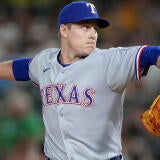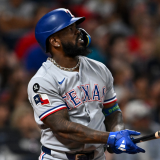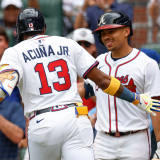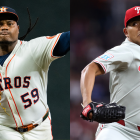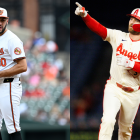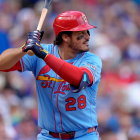
Michael Busch makes MLB history and keeps the Cubs alive with NLDS Game 3 win vs. Brewers
Busch, who has quietly helped carry the Cubs all year, hit a leadoff home run Wednesday night
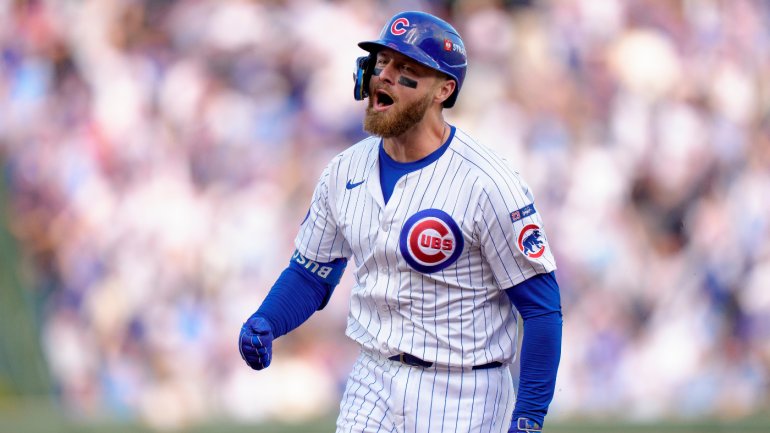
CHICAGO – Given how early it happened and everything that happened afterward -- all those abortive threats by the Milwaukee offense and tense outs recorded by the Chicago bullpen -- it's easy to forget Michael Busch's contributions, his necessary contributions. They're there, though, within the 4-3 final score that means a Game 4 back in Wrigley Field on Thursday. That's fitting in a sense because it seems like Busch's essential work in 2025 has been overshadowed by those of the bigger names and the more alluring styles who share his uniform.
In the bottom of the first on Wednesday with the Cubs in an early 1-0 hole -- a score that was partly the result of Busch's having lost an infield pop-up in the afternoon sun -- Busch led off the home half against Milwaukee starter Quinn Priester.
After Busch worked the count full after laying off a 2-2 sinker just off the plate, Priester confronted him with a cutter that didn't cut all that much. Busch did not miss:
That's Busch's third home run in six postseason games this year, and over that span he's now slashing .300/.364/.750 in these playoffs. The homer above was Busch's only hit of Game 3, but without it the Cubs and Brewers might still be playing. Oh, that also made Busch the first player in Major League Baseball history to hit multiple leadoff home runs in the same postseason series.
"Look, Michael, you can just tell by the way they manage the game, he's become the guy in the lineup that everybody is thinking about and they're doing their pitching around him, and that's a credit to the player," Cubs manager Craig Counsell said of Busch after Game 3. "It really is. It's not easy to do, and he's put us off to a great start a whole bunch of these games."
Busch is not a central-casting kind of leadoff hitter. He's not fast (he's in the 26th percentile in sprint speed), he's a first baseman of all things, he walks at an above-average clip but not necessarily by No. 1 hitter standards, and power is his carrying tool. Still and yet, the Cubs have come to prefer him the role he's filled pretty consistently since the last week of July. Along the way, 16 of his those 34 regular-season home runs came from that leadoff spot. "Yeah, it doesn't always go that way, but just try to have a good at-bat," Busch after Game 3 said of his approach from the top of the batting order. "From the moment I was placed in that spot, they put me there, and I thought, why change what I do, and just having a good at-bat, staying aggressive, trusting my eyes."
This isn't a case of a regular-season forgettable rising above his established level and finding October glory. With Busch, he's a bedrock producer who's kept on producing after the calendar flipped to that most crucial of baseball months. Just because -- it says here -- Busch doesn't quite get the attention his contributions merit, it doesn't diminish from his overall value to the Cubs.
During this, his age-27 season, Busch slashed .261/.343/.523 with a team-leading 34 home runs. That slash line is good for an OPS+ of 147 which also led the Cubs and ranked seventh among all qualifiers in MLB. As well, Busch in 524 regular-season at-bats hit into just two double plays. He backed up all that production with elite batted-ball metrics, all of which bode very well for his capacity to maintain such strong top-line production moving forward.
If anything, Busch may have been a bit unlucky this season. On that front, let's look at wOBA, or Weighted On-Base Average, which assigns proper value to every possible offensive event that happens while a batter is at the plate. Those proper valuations of singles, doubles, homers, walks, etc., distinguish wOBA from more traditional measures. Then comes xwOBA, or Expected Weighted On-Base Average. Building off wOBA, xwOBA an estimation of what a hitter's wOBA should be based on quality of contact and batted-ball authority. xwOBA attempts to strip away luck -- bad or good -- and defensive play from wOBA and identify a hitter's baseline skill. It's useful for getting an idea of how a hitter figures to perform in the near-term future. Basically, if a hitter's xwOBA is significantly lower than his wOBA, he's probably going to come back to earth at some point. On the other side of things, if a hitter's xwOBA is quite a bit higher than his wOBA, then better days may be ahead.
In Busch's case, this season he had a wOBA of .369, which, as you would expect, is excellent. Busch's xwOBA, however, was all the way up at .392, which put him in the 95th percentile among big-league hitters. That's a big gap between wOBA and xwOBA, and it means Busch deserved to be even better than he was.
Speaking of deserved, he also deserves more attention for what he's done. When he was acquired from the Dodgers in January of 2024, Busch had the faint whiff of "failed prospect" about him, but in part that was a function of the lack of opportunity in L.A. In Chicago, Busch has gotten regular run, and Counsell has put him in a position to succeed by limiting his exposure to left-handed pitching (that's why he wasn't in Counsell's starting lineup for Game 2 against the Brewers opposite Aaron Ashby). This season, for instance, Busch logged just 19.1% of his plate appearances against same-side pitching.
So, yes, Busch was something of a platoon player, but the heavy half of a platoon, if they hit like Busch did, is a darned valuable player. Speaking of which, Busch's 4.5 WAR for the season tied that of Kyle Tucker and Dansby Swanson and trailed just that of Nico Hoerner (6.1) and Pete Crow-Armstrong (6.0). Busch is undeniably a fulcrum for the Cubs' offense, just as he was in Wednesday's elimination game. It's not a stretch to say that without Busch, the Cubs may not be playing a Game 4. It's likewise defensible to say that without Busch, the Cubs might not be in the playoffs at all. In light of how little credit accrues to him, all of that may qualify as surprising.


